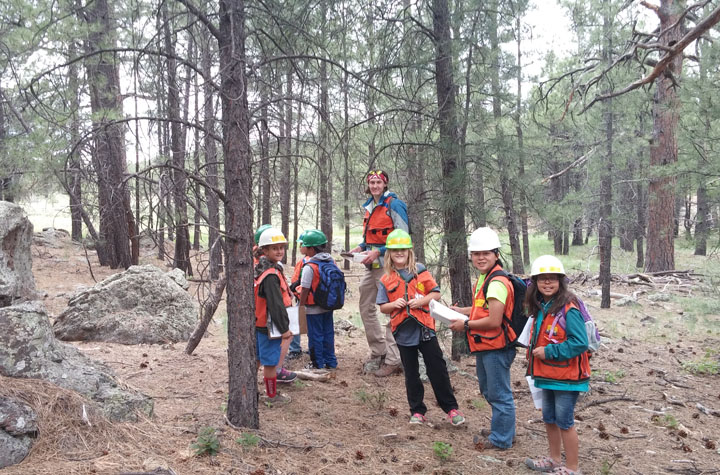This summer, campers enrolled in the Junior Forester Academy will learn more than just forest science and natural resource management principles while participating in a rapid-fire global data sharing movement known as a BioBlitz.
The first BioBlitz began in 1996 as an attempt to bring together scientists, students, teachers and other community members to catalogue and document every living species in a specific area, like a national park, reserve or forest, over a short period of time. Dozens of BioBlitzes have since popped up around the globe, and the information gathered and shared through digital applications like iNaturalist has provided valuable open data about biological diversity for researchers.
For NAU Centennial Forest Manager Cheryl Miller, the opportunity to host a BioBlitz for the JFA campers fit in with the mission of the Centennial Forest, which provides in-field research and education opportunities for university and school-age students.
“Our whole goal with the BioBlitz is to nurture the love of nature in kids,” she said. “If they have a relationship with some of the species out in the forest, then they’re much more likely to protect it.”
In the summer, the Centennial Forest is home to week-long forestry camps like JFA, where campers ages 9 and 10 learn about natural resource management, outdoor leadership and environmental science. The campers come from all over the state and three-quarters of the 28 campers receive some form of financial scholarship to help connect them with nature and learn more about the natural world.
Campers for the first session in June will participate in the five-hour BioBlitz as a special edition to the camp’s curriculum. Scientists from NAU, like wildlife ecologist Carol Chambers and soil biologist Anita Antoninka, and the U.S. Forest Service’s Rocky Mountain Research Station will lead teams of campers as they locate, identify and document as many living species as time allows during the blitz.
“The benefit for the kids is they will be able to put themselves in the shoes of a scientist for a day and see what it’s like,” Miller said. “It’s also to help them understand the concept and value of diversity.”
Miller said that the ultimate goal is to create the next generation of environmental stewards. To truly make a positive impact on the environment, she said, it’s most important that the campers think critically about solving the problems the natural world faces today; simply acknowledging the problem is not enough.
“No other university that I know of offers a program exactly like the Junior Forester Academy,” Miller said. “The program is an introduction to environmental science and the world of forestry but it’s also an opportunity to nurture the love of nature in kids, get them outside and show them why we should protect it.”
The National Geographic Society and the U.S. Forest Service awarded the Centennial Forest a $5,000 grant to host a BioBlitz on its 120-acre field campus southwest of Flagstaff. The money will go toward supplies and assist in camper scholarships. The data collected from the event will be uploaded to iNaturalist for public access. The BioBlitz will take place on Thursday, June 9, with campers presenting their findings the following day.



